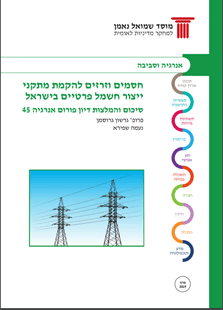Greenhouse Gas Emissions Reporting and Registration System in Israel: Summary of Reports for 2017

65 companies and organizations submitted their reports to the Voluntary GHG Registry in 2017 to the Ministry of Environmental Protection. Each of the reporting companies, enclosed a signed statement regarding the reliability of the data, as required by the Reporting and Registration System, which was developed by SNI in cooperation with the Ministry of […]
Energy Forum 45: Barriers to and incentives for constructing private electricity generation facilities in Israel

The reform in the electricity sector has created a new reality that aims to gradually reduce the generation of electricity by the Israel Electric Company (IEC) and shift it to private electricity producers while keeping, at the same time, the transmission, distribution, and metering in the hands of the IEC. The management of the system […]
Private electric transportation readiness guide for municipalities
Electric mobility fundamentally changes the demand patterns of energy used for the transportation of people and goods, which is a vital share of any modern economy. The gradual replacement of internal combustion engine (ICE) vehicles with electric vehicles (EVs) is expected to carry broad implications over the energy sector, as well as both the natural […]
Energy Forum 44: Environmental, economic, and security considerations concerning the location of the gas treatment platform for the Leviathan reservoir
Abstract in English: As a result of the gas discoveries, the State of Israel has recognized the connection of offshore drilling to the shore as a national infrastructure project, and therefore, the need to implement a National Master Plan (NOP) on the subject was raised. The main conclusions of NOP 37/H “Receiving and Treatment of […]
A Comparative Study of the Carbon Capture Alternatives in the Production of Natural Gas-based Transportation Fuels
Carbon capture and storage (CCS) is a process in which carbon dioxide (CO2) is captured from emissions of industrial and energy production processes, and is stored without returning to the atmosphere. The goal of the process is to reduce the impact of anthropogenic greenhouse gases (GHGs) on climate change. CCS is composed of 3 main […]
How to Generate Information from Round Table Discussions: A Methodological Paper
The common denominator in Round Tables (RT) discussions is that an agenda with key questions and objectives is prepared and disseminate before the event. Some of the RT are very structured and some are more loosely facilitated. Eventually a report is prepared summarizing key findings and recommendations. This note is presenting different methodological approaches for […]
Energy Forum 43: Breaking Israel’s energy isolation
The Israeli energy market has unique characteristics. One of its main problems is that the state is isolated from its neighbors in terms of energy supply and export, making it a kind of “energy island.” This applies to various fuels, such as natural gas, and to electricity: the state provides itself with electricity and is […]
Greenhouse Gas Emissions Reporting and Registration System in Israel: Summary of Reports for 2016

63 companies and organizations submitted their reports to the Voluntary GHG Registry in 2016 to the Ministry of Environmental Protection. Each of the reporting companies, enclosed a signed statement regarding the reliability of the data, as required by the Reporting and Registration System, which was developed by SNI in cooperation with the Ministry of Environmental […]
Energy Forum 42: Psychological and Behavioral Aspects of Energy Conservation
In recent years, the demand for energy has been increasing, due, in part, to the growth in the population, the rise in the standard of living, and economic growth. Increasing use of energy involves the investment of financial resources, exploitation of scarce land resources, and even the intensification of the climate crisis, as the global […]
Electric Vehicles Charging Infrastructure in Israel: Implementation Policy and Technical Guidelines
The objectives of the research are to review the best practices for the deployment of electric vehicle (EV) charging infrastructure, specify optimal models for the Israeli case, and provide actionable guidelines for implementation. The focus of the research is public charging infrastructure for passenger electric vehicles and Light Commercial Vehicles (LCV), which represents the vast […]
